Gone are the days of pen and paper for scheduling tasks. Is your business stuck in the past?
Digital scheduling software lets you easily:
- Create employee schedules.
- Track time and labor costs.
- Keep employees organized.
But with so many scheduling platforms on the market, which is best?
Keep reading to learn how to choose the best job scheduling app for your business.
Let’s jump in!
What is a job scheduling app?
A job scheduling app is a software tool that manages your employees:
- Shifts.
- Assignments.
- Work schedules.
With advanced features like auto-scheduling and filter views, these apps let you:
- View employee availability.
- Manage time-off requests.
- Facilitate team communication.
- Monitor job progress in real time.
They give your employees functionality too. They can:
- Clock in with mobile access.
- Easily pick up and swap shifts.
- Request time off.
- Access job information and real-time updates.
By automating manual tasks, employee job scheduling apps help you reduce errors and improve overall efficiency.
Key features to look for in a job scheduling app
When choosing a scheduling app, prioritize features that maximize your investment. Look for the following functionalities in your ideal software.
Ease of use for employees
A job scheduling app should offer an intuitive interface for smooth navigation. With features like drag-and-drop scheduling, your team members can manage their time effectively without constant oversight.
This user-centric design leads to:
- Quick, minimal training.
- Higher adoption rates.
- Fewer scheduling mistakes.
Integration capabilities
Your scheduling software should seamlessly integrate with current systems, including:
- Payroll systems.
- HR platforms.
- Project management tools.
This connectivity empowers you with:
- Reduced manual data entry.
- Smooth data flow between systems.
- Task automation for increased efficiency.
Cost-effectiveness
Your job schedule app should offer a good balance between cost and functionality. Beyond initial investment, consider the app’s positive, long-term impact on your administrative costs and productivity.
Some apps offer tiered pricing plans that let you pay only for the features you need. This makes it easy to find a solution that fits your budget while delivering the necessary functionality.
By focusing on key features, you’ll select a scheduling app that offers the best value for your money.
Best job scheduling apps for trades contractors in 2024
Without further ado, here are the best job scheduling apps for trade contractors.
Method:Field Services
Method:Field Services is the best job scheduling software for QuickBooks and Xero users. The platform’s two-way sync lets you centralize information and create a seamless flow between your accounting software and Method.
With Method, you can:
- Assign shifts and jobs.
- Generate estimates and invoices.
- Customize features to your unique needs.
Features and benefits
- Filter views for automated scheduling and dispatching.
- 360-degree view of crew members’ schedules.
- One-click conversion of estimates to invoices.
- Real-time job updates and route mapping.
- Robust analytics with customizable reports.
Limitations
- Suited for QuickBooks and Xero users.
- Only available in English.
Reviews
Method:CRM receives high praise for its QuickBooks integration and vast customization options. Users also appreciate its workflow automation features, from lead management to job scheduling.
Cost
Method:Field Services offers two pricing options, depending on your role:
- Field Crew Technician: $15 per month.
- Dispatcher: $45 per month.
Method also offers a 14-day free trial with no commitment or credit card required.
ClickUp
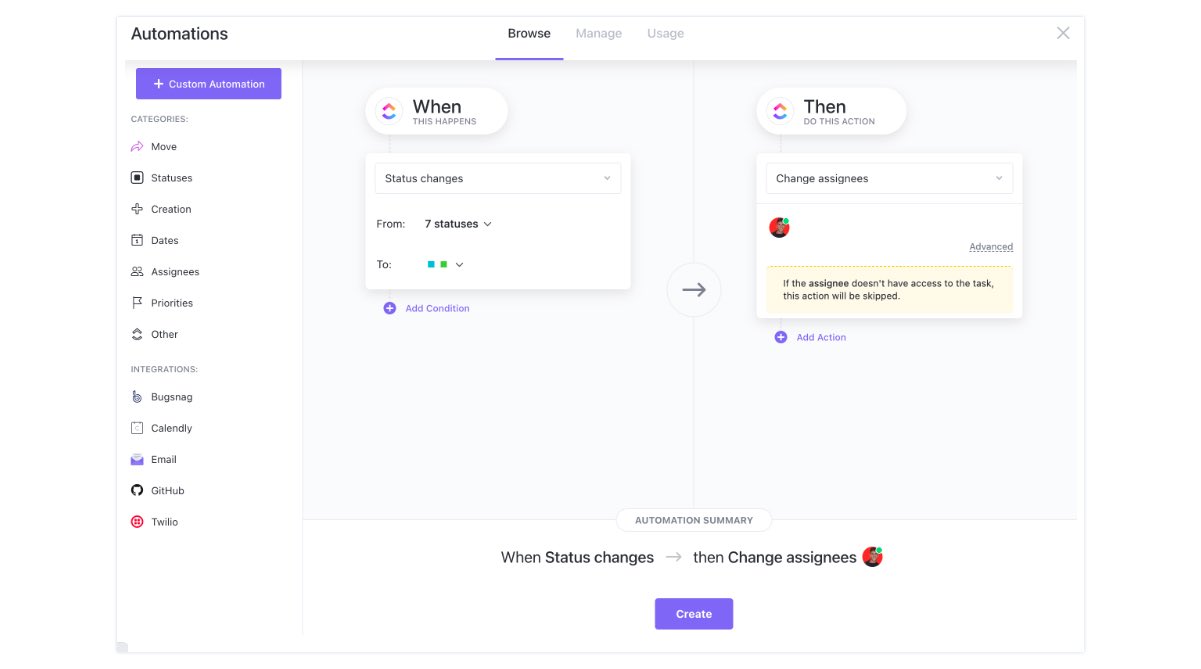
Image credit: ClickUp
ClickUp is a business productivity software that lets you manage your projects with ease. It offers a calendar view to see goals and employee work schedules from a single location.
What’s more is that ClickUp provides customizable templates to tailor the software to your needs.
Features and benefits
- Employee reminders for important tasks.
- Gantt chart view with drag-and-drop interfaces.
- Integrations with Google Calendar and other time planning tools.
- “Employee Schedule Template” for weekly shift planning.
Limitations
- Overwhelming user interface.
- Steep learning curve for non-tech-savvy users.
Reviews
Reviewers commend ClickUp for its flexibility and no-code customization. They also value its ability to integrate with more than 1,000 tools.
On the downside, some users find ClickUp’s reporting and time tracking tools challenging to navigate.
Cost
ClickUp offers three pricing plans:
- Unlimited: $5 per user per month.
- Business: $12 per user per month.
- Business Plus: $19 per user per month.
They also offer a “Free Forever” plan with limited functionality at no cost. For larger teams, contact sales for a custom price.
QuickBooks Time
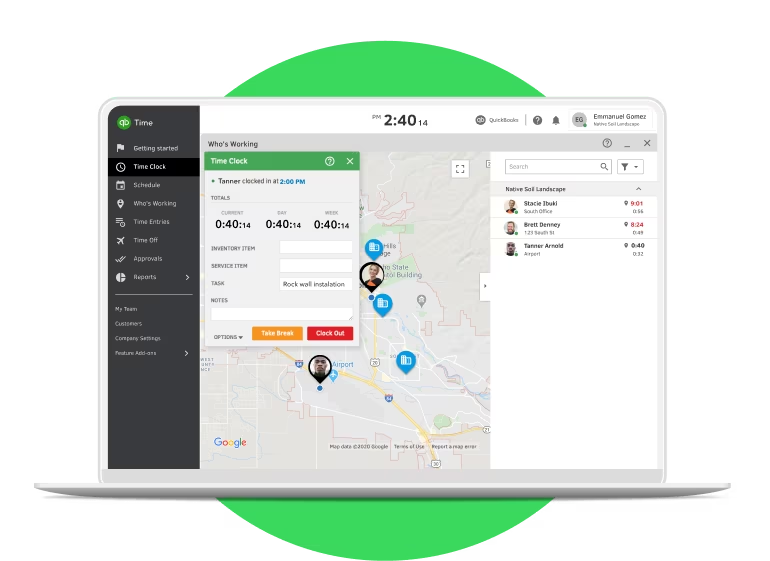
Image credit: QuickBooks
QuickBooks Time is a cloud-based, GPS software for field service teams. It automates time tracking and offers scheduling features to manage calendars by job or shift.
Features and benefits
- GPS tracking for employees on the go.
- Job and project tracking, including timestamp recording.
- Automated notifications for crew member attendance and break times.
- Mobile time clocks and facial recognition for secure clock-ins.
- Geofencing to monitor designated areas.
Limitations
- Difficult to learn.
- Costly upgrades to add certain features.
- Mobile app is glitchy and slow to load.
Reviews
Reviewers appreciate QuickBooks Time for its intuitive user experience and strong time tracking features. It integrates smoothly with QuickBooks to simplify your payroll workflow.
However, some users report a learning curve and issues with facial recognition upon sign-in.
Cost
QuickBooks Time offers two pricing options:
- Premium: $14 per month.
- Elite: $28 per month.
Note: You can use QuickBooks Time on its own or integrate it with other QuickBooks plans.
Calendly
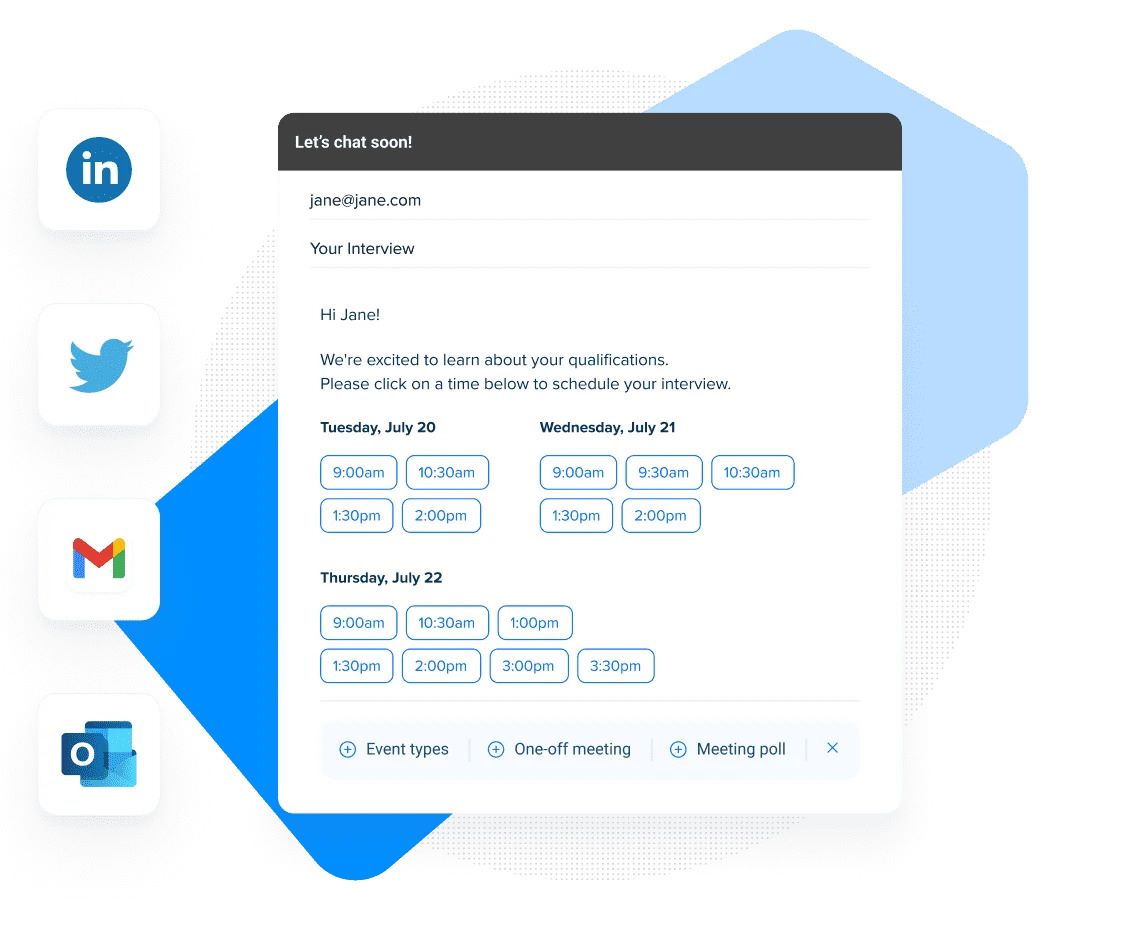
Image credit: Calendly
Calendly is a scheduling software that simplifies appointment setting and calendar management.
With Calendly, your customers can book appointments directly through the software. This cuts down on back-and-forth communication and speeds up business transactions.
Features and benefits
- Automated appointment scheduling for seamless booking.
- Integrations with iCloud, Outlook, and Google Calendar.
- Intelligent scheduling for alignment across time zones.
- Automated follow-ups and reminders to minimize no-shows.
Limitations
- Advanced features require paid plans.
- Becomes complex when you use several event types.
- Internet access is required for appointment booking and management.
Reviews
Reviewers commend Calendly for simplifying the scheduling process. Users also note long-term positive impacts on customer satisfaction and administrative efficiency.
However, features in the free version are seriously lacking. Some also note difficulties with complex schedules.
Cost
In addition to a free plan, Calendly offers a range of pricing options:
- Standard: $10 per seat per month.
- Team: $16 per seat per month.
- Enterprise: Starts at $15,000 per year
Jobber
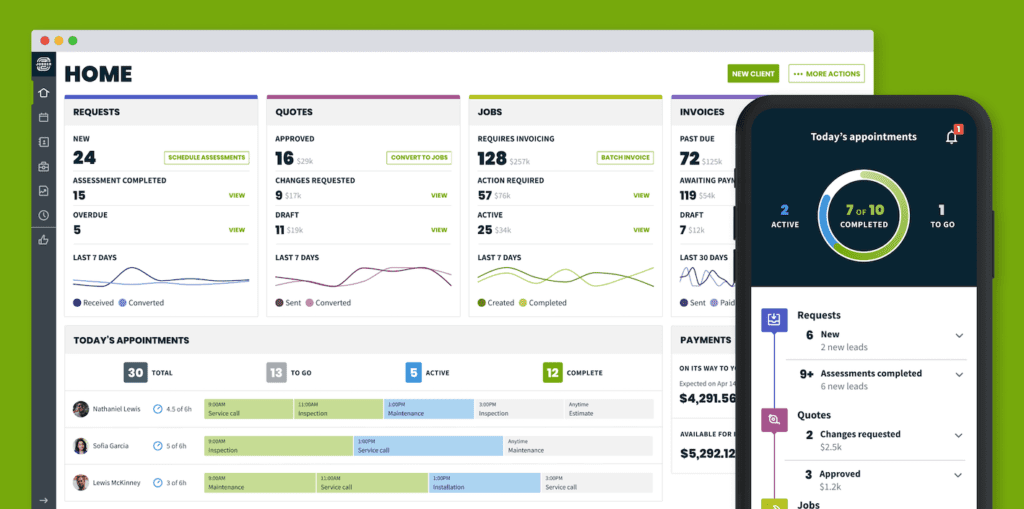
Image credit: Jobber
Jobber is a cloud-based scheduling software that keeps your team organized. It offers extensive features that let you:
- Schedule and dispatch jobs with ease.
- Optimize routes for efficient business operations.
- Track employee productivity in real time.
- Integrate with popular tools like QuickBooks Online.
Features and benefits
- Effortless quote-to-job conversion.
- Client portals for hassle-free booking.
- Mobile app for easy on-the-go access.
- Drag-and-drop scheduling and dispatching.
- Customizable features for recurring shifts and one-time projects.
Limitations
- Offers limited offline functionality.
- Has difficulties duplicating entries on the interface.
- May be too expensive for small business owners.
- Challenges syncing with QuickBooks and other accounting tools.
Reviews
Reviewers appreciate Jobber for its time-saving features and user-friendly interface. Users also commend Jobber’s mobile app for its simplicity and effectiveness.
However, some note the software’s high cost as a downside.
Cost
Jobber offers three pricing plans:
- Core: $49 per month for 1 user.
- Connect: $149 per month for up to 7 users.
- Grow: $299 per month for up to 30 users.
- Additional users are $19 per month each.
Homebase
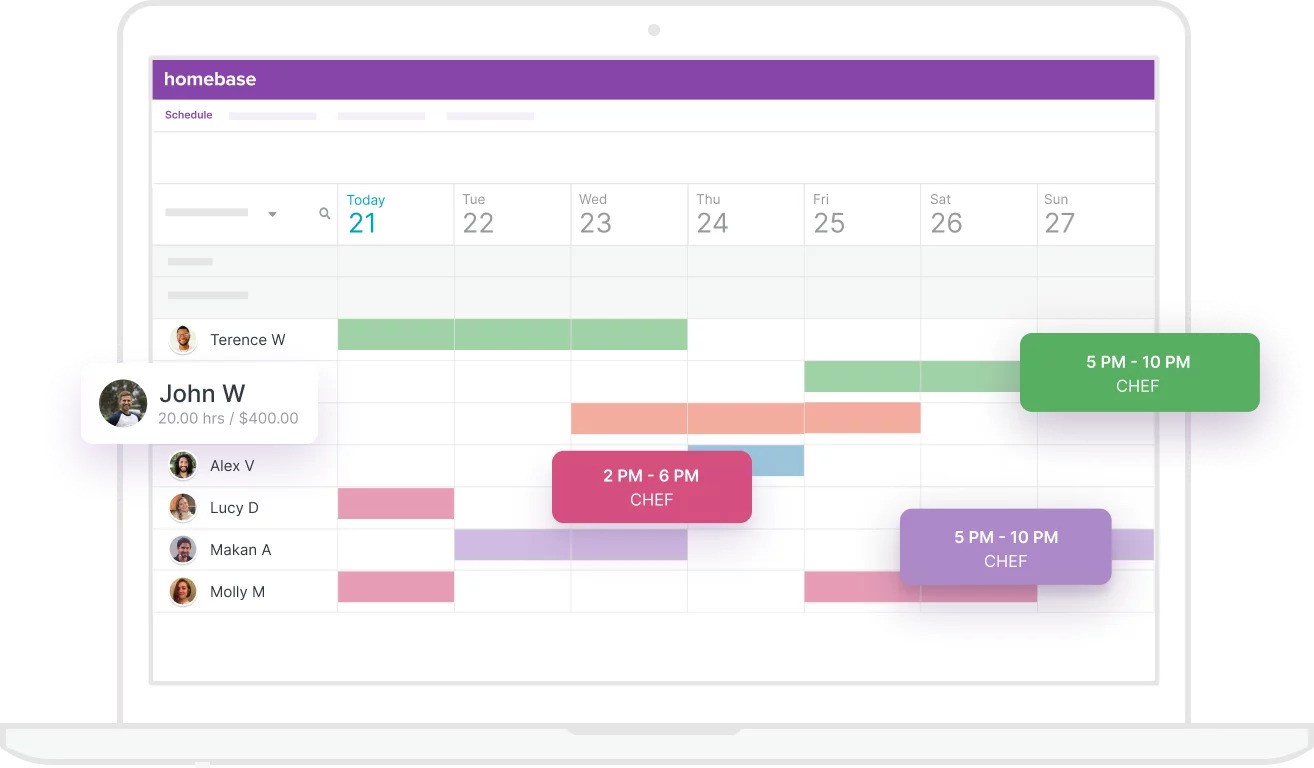
Image credit: Homebase
Homebase is a workforce management software that helps businesses with their:
- Scheduling.
- Time tracking.
- Payroll processes.
It’s an intuitive platform that caters to a wide range of industries, especially those with hourly teams.
Features and benefits
- Automated schedule creation and time tracking.
- Shift swapping and time-off requests directly through the app.
- Built-in messaging, real-time alerts, and automated reminders.
- Time-off management in compliance with labor laws.
Limitations
- Learning curve to implement software across the team.
- Advanced features are reserved for higher-tier plans.
Reviews
Homebase is well-received for its simple interface and comprehensive suite of tools. Users value its integration of scheduling and payroll processing into one cost-effective solution.
However, navigating the full range of features is challenging for some.
Cost
Homebase offers tiered pricing to fit different business needs. It has four options:
- Basic: Free.
- Essentials: $20 per month.
- Plus: $48 per month.
- All-in-One: $80 per month.
Top benefits of job scheduling apps
Create schedules with ease
Scheduling apps let you create and adjust team calendars in just a few clicks. They also highlight gaps in your work schedule. You can leverage this information to:
- Follow up on new leads.
- Address scheduling conflicts quickly.
- Adapt to last-minute changes.
Better yet, this ease of use prevents overstaffing and understaffing for optimal team levels.
Share estimates and invoices from the job
Job scheduling apps make it easy to generate estimates and invoices directly from the job site. This simplifies the billing process and ensures prompt delivery of financial documents to your clients.
Not to mention, the swift dispatch of estimates and invoices facilitates:
- Faster client approval.
- Reduced turnaround time for payments.
- Enhanced transparency.
- Optimized cash flow.
Maintain customer contact data
A key feature of many job scheduling apps is that they manage customer information securely. By having all the necessary contact details at your fingertips, you can:
- Track client information.
- Simplify your scheduling process.
- Enhance customer service.
- Ensure timely communication.
Simplify your time tracking and payroll workflow
Job schedule apps simplify time tracking by automatically capturing:
- Employee hours.
- Overtime.
- Sick leave and vacation days.
Plus, job scheduling software enhances your payroll workflow by tracking:
- Labor costs.
- Billable hours.
- Nonbillable hours.
When you integrate job scheduling with your payroll software, you reduce payroll errors and spend less time on processing.
Automate customer and internal communication
Job scheduling apps come with built-in communication tools that automate:
- Appointment reminders.
- Upcoming shift alerts.
- Notifications about shift swaps.
As a result, you reduce miscommunication and enhance your operational efficiency.
Job scheduling app: Wrap-up
The best job scheduling apps empower seamless team coordination and enhanced efficiency.
However, the ideal app differs for each business, so be sure to choose one that aligns with your goals and needs. If you’re a QuickBooks or Xero user, Method:Field Services is the ideal solution to stay organized and centralize information.
With the right job scheduling app, you spend less time managing your team and more time pursuing new clients.
Job schedule app FAQs
How does a work schedule app work?
A work schedule app lets business owners create and distribute job schedules digitally. These apps also come with employee scheduling features that let workers:
- Input their availability.
- Trade shifts with colleagues.
- Receive notifications about upcoming shifts or changes.
How much does a job schedule app cost?
The cost of a job schedule app depends on its:
- Features.
- Pricing model.
- User limits.
Prices span from free, basic versions to high-end premium plans. For a cost-effective job scheduling solution, consider Method:Field Services.
See how Method:Field Services turns your scheduling mess into success.
Image credit: Mikael Blomkvist via Pexels


